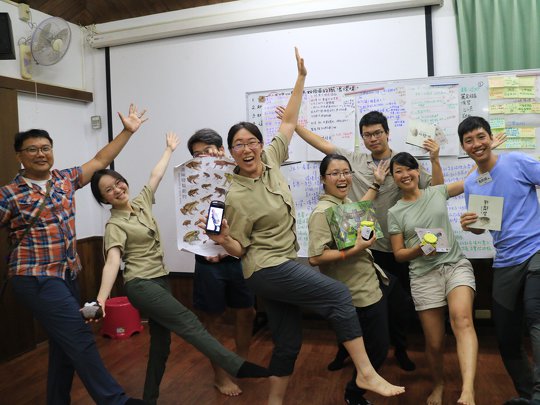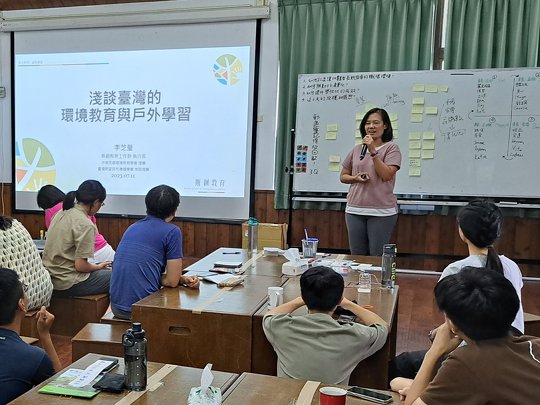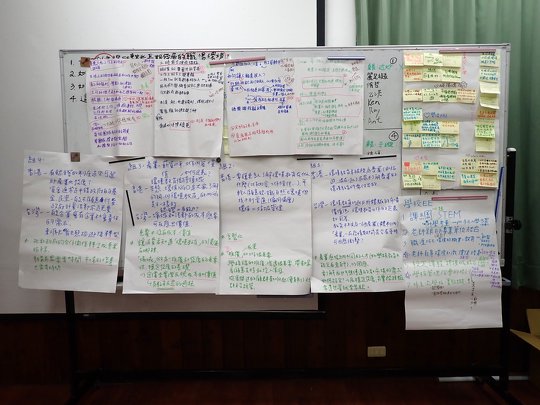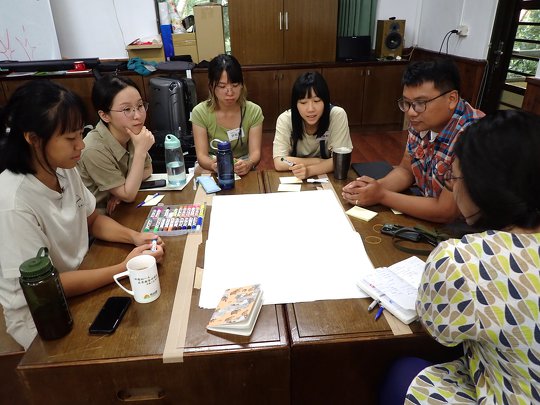Sharing by OWLHK team members
Dr. Xoni Ma (Founder and Education Director)
Thank you Ms. Lee Chih-ying, Chief Executive Officer of EnvEd Centre for Innovative Learning, for introducing us the status quo of Taiwan environmental education, and hosting the World Café interflow activity. On that day, at noon, we collected topics that everyone was interested in and, after some quick analysis, four topics were come up for discussion. For each topic at a table, two ‘table hosts’, one from each of the Taiwan and Hong Kong representatives, led the interflow. Jin-miao, the environmental education teacher from Shuangliu, and I were the “table hosts”. We led participants to discuss on the topic ‘how to create a workplace that stimulates environmental education practitioners’ long-term development’. This topic is far-reaching and essential as it is related to how the whole environmental education industry could flourish. During the discussion process, everyone shared their ideas actively. I felt so delighted to see even junior staff could as well dare to express their thoughts. After the interflow exercise, Jin-miao and I have summarized into three main ideas: 1. Colleagues share the same vision as the organizations, and able to find the meaning of environmental education work; 2. There is good communication among team members, with trust and respect. They are also given sufficient space and opportunities to find pleasure in environmental education works; 3. Organizations have established with sound regulations and mechanisms, including benefits and chances of promotion. This could help workers to realize the prospect and hope in environmental education.
Despite the differences of environmental education in Taiwan and Hong Kong, such discussions have proved that we are in fact encountering similar problems, and our objectives could be similar as well. Teacher Sun, an environmental education teacher from the Dongyuan tribes, once said that the reason of contributing to the environmental education industry for a long period of time was because of ‘unwilling to let go’ of the nature. The love towards the nature and our land is the fundamental element of environmental education, and such vocation, could be found in both Taiwan and Hong Kong. Hopefully we, as environmental education practitioners in Hong Kong, could take a leaf out of someone’s book. Let’s work together, and take Hong Kong environmental education further!
Kayson Lo (Senior Project and Conservation Officer)
In just 2-3 hours of interflow and discussion, we could observe the differences of environmental education in Taiwan and Hong Kong, particularly in the aspects of policy, development and implementation. Hong Kong environmental education has made great progress in recent years. For instance, the Education Bureau has gradually promoted environmental education in secondary and primary schools, and collaborated with different NGOs to carry out external environmental education lessons and learning programmes. Concurrently, committees like Environment and Conservation Fund and Lantau Conservation Fund had subsidized NGOs to organize different types of environmental education and environmental protection programmes, enabling the public to have more chances to understand the nature and be educated about eco-friendly practices. It has cultivated the public to realize the interdependence between an individual and the society/environment. Regardless of this, the abovementioned environmental education programmes and activities are optional, implying that most of the participants are those who already have an interest and understanding in nature and environmental protection. Under such circumstances, environmental education, in fact, could not be promoted to those who are not actively interacting with and learning about environmental education and eco-friendly events. On the other hand, in Taiwan, the Environmental Education Act stipulated that all public organizations, schools, as well as corporations and organizations with a certain scale, its staff, teachers and students are required to participate in environmental education activities for above 4 hours every year. This practice enhances citizens’ understanding and responsibilities towards the environment. It further assists environmental education to be spread to various groups and public sectors.
Though Hong Kong’s environmental education has been kept going, the progress is slow. Hopefully, the Hong Kong government could promote more on environmental education. With the professionalization of environmental education. It could be promoted to different public sectors, and stimulate local sustainable development.
Andrew Lai (Assistant Project Officer)
Being environmental educators, we believe that education is an essential element in responding to global environmental issues. However, it is challenging to promote environmental education in Hong Kong. In the World Café interflow session, we are fortunate to exchange ideas with practitioners from Taiwan related to environmental education development experiences and directions. We envy how environmental education is implemented in Taiwan, for instance, its Environmental Education Act and the professional certification of Taiwan’s environmental education teachers. Nevertheless, after discussion, we realized actualizing environmental education professionalization did have obstacles that may be easily overlooked. For example, how could the related certification mechanism objectively appraise and reflect the experience of an environmental education teacher? Certainly, such discussions could be done in later stages as Hong Kong has never stipulated related environmental education regulations and certification system, which had relatively slow progress when compared to Taiwan’s environmental education development. If the government is eager to consider environmental education in policies (such as stipulating a professional certification system and adopting environmental education into existing education curriculum), it would be a great recognition and encouragement to the overall industry!
To ensure long-term development of Hong Kong environmental education, we must establish the environmental education industry and its branding, of which the government, corporations and public could realize its uniqueness and value. Hopefully, in the near future, we could proudly introduce ourselves with, “I am an environmental education teacher!”



